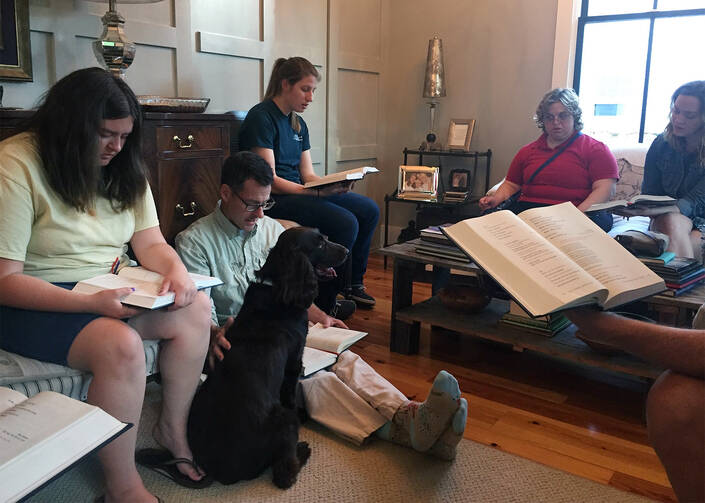During the evening prayer service at a new residential complex in Fayetteville, N.C., young people took turns reading from the Gospel of Luke, reciting a psalm and singing some prayers.
They paid no mind as one woman tripped over some words in the liturgy. They congratulated another person who, at the end of the Lord’s Prayer, blurted out, “What does ‘amen’ mean?”
“Good question!” some exclaimed in unison.
Such moments are common at the weekly service here, where a mix of graduate students and a handful of adults with developmental disabilities share living quarters.
Friendship House, as they call their co-housing space, is in many ways an outgrowth of the thinking of Jean Vanier, the Catholic theologian and humanitarian who died in May and who changed the way many Christians view disability. Vanier tore down the separation between the able and disabled and between those helping and those being helped with his signature creation, L’Arche, a worldwide network of homes where people with and without disabilities live and work as peers.
The Fayetteville Friendship House is meant to attract people studying for careers in health care. The house is the brainchild of Scott Cameron, a physician, who realized he needed to change his own attitude about some of the diagnoses he delivers to parents of babies he cares for at a neonatal intensive care unit. With Friendship House, he hopes to share that insight with a larger group of health care students.
“I think it will help them change the way they view disabilities,” he said, “not as something that is broken, but something that can be celebrated.”











Friendship House is a wonderful idea, carrying forward Jean Vanier's vision in his L'Arche movement. I would raise just one issue with Dr. Cameron's description of disability "not as something that is broken, but something that can be celebrated." As a neonatologist, he has to deliver some difficult diagnoses, and frankly, they do include things that are broken. You have to acknowledge that, I think, before you can celebrate. My now 36-year old daughter spent months in a neonatal intensive care unit, experienced an intraventricular hemorrhage, and lives with spastic cerebral palsy. Things are indeed "broken" in her brain and neuromuscular system. Her life is more challenging than most. Yes, she enjoys life and celebrates the many good things it includes, but those who don't live with disabilities may want to reconsider the somewhat blithe and offhanded-sounding terminology about "something that can be celebrated". My daughter would, I think, celebrate not needing a wheelchair, or many other aspects of her physical life which make it harder every day. Celebrate the community at Friendship House, yes, but not necessarily the conditions that render some residents' lives more challenging.
Jean Vanier was a pillar of strength to many.